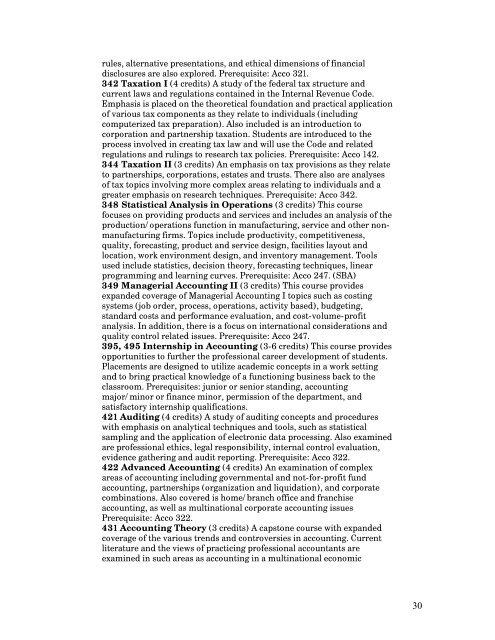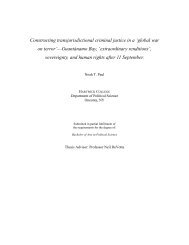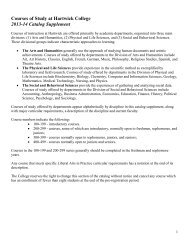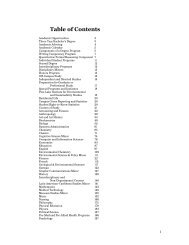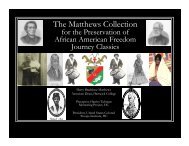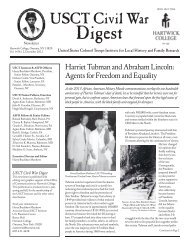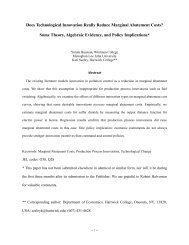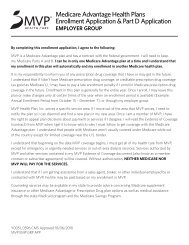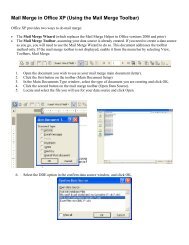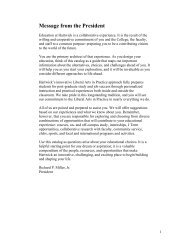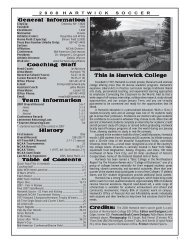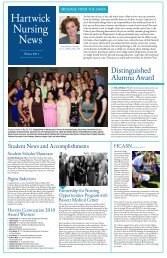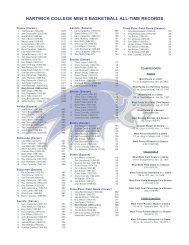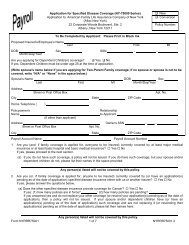Table of Contents - Hartwick College
Table of Contents - Hartwick College
Table of Contents - Hartwick College
You also want an ePaper? Increase the reach of your titles
YUMPU automatically turns print PDFs into web optimized ePapers that Google loves.
ules, alternative presentations, and ethical dimensions <strong>of</strong> financial<br />
disclosures are also explored. Prerequisite: Acco 321.<br />
342 Taxation I (4 credits) A study <strong>of</strong> the federal tax structure and<br />
current laws and regulations contained in the Internal Revenue Code.<br />
Emphasis is placed on the theoretical foundation and practical application<br />
<strong>of</strong> various tax components as they relate to individuals (including<br />
computerized tax preparation). Also included is an introduction to<br />
corporation and partnership taxation. Students are introduced to the<br />
process involved in creating tax law and will use the Code and related<br />
regulations and rulings to research tax policies. Prerequisite: Acco 142.<br />
344 Taxation II (3 credits) An emphasis on tax provisions as they relate<br />
to partnerships, corporations, estates and trusts. There also are analyses<br />
<strong>of</strong> tax topics involving more complex areas relating to individuals and a<br />
greater emphasis on research techniques. Prerequisite: Acco 342.<br />
348 Statistical Analysis in Operations (3 credits) This course<br />
focuses on providing products and services and includes an analysis <strong>of</strong> the<br />
production/operations function in manufacturing, service and other nonmanufacturing<br />
firms. Topics include productivity, competitiveness,<br />
quality, forecasting, product and service design, facilities layout and<br />
location, work environment design, and inventory management. Tools<br />
used include statistics, decision theory, forecasting techniques, linear<br />
programming and learning curves. Prerequisite: Acco 247. (SBA)<br />
349 Managerial Accounting II (3 credits) This course provides<br />
expanded coverage <strong>of</strong> Managerial Accounting I topics such as costing<br />
systems (job order, process, operations, activity based), budgeting,<br />
standard costs and performance evaluation, and cost-volume-pr<strong>of</strong>it<br />
analysis. In addition, there is a focus on international considerations and<br />
quality control related issues. Prerequisite: Acco 247.<br />
395, 495 Internship in Accounting (3-6 credits) This course provides<br />
opportunities to further the pr<strong>of</strong>essional career development <strong>of</strong> students.<br />
Placements are designed to utilize academic concepts in a work setting<br />
and to bring practical knowledge <strong>of</strong> a functioning business back to the<br />
classroom. Prerequisites: junior or senior standing, accounting<br />
major/minor or finance minor, permission <strong>of</strong> the department, and<br />
satisfactory internship qualifications.<br />
421 Auditing (4 credits) A study <strong>of</strong> auditing concepts and procedures<br />
with emphasis on analytical techniques and tools, such as statistical<br />
sampling and the application <strong>of</strong> electronic data processing. Also examined<br />
are pr<strong>of</strong>essional ethics, legal responsibility, internal control evaluation,<br />
evidence gathering and audit reporting. Prerequisite: Acco 322.<br />
422 Advanced Accounting (4 credits) An examination <strong>of</strong> complex<br />
areas <strong>of</strong> accounting including governmental and not-for-pr<strong>of</strong>it fund<br />
accounting, partnerships (organization and liquidation), and corporate<br />
combinations. Also covered is home/branch <strong>of</strong>fice and franchise<br />
accounting, as well as multinational corporate accounting issues<br />
Prerequisite: Acco 322.<br />
431 Accounting Theory (3 credits) A capstone course with expanded<br />
coverage <strong>of</strong> the various trends and controversies in accounting. Current<br />
literature and the views <strong>of</strong> practicing pr<strong>of</strong>essional accountants are<br />
examined in such areas as accounting in a multinational economic<br />
30


